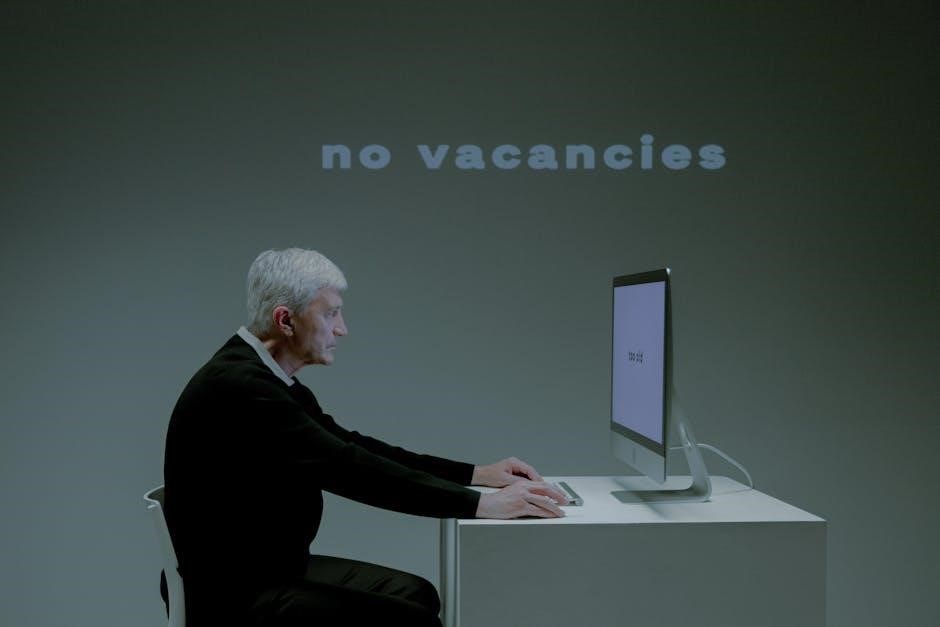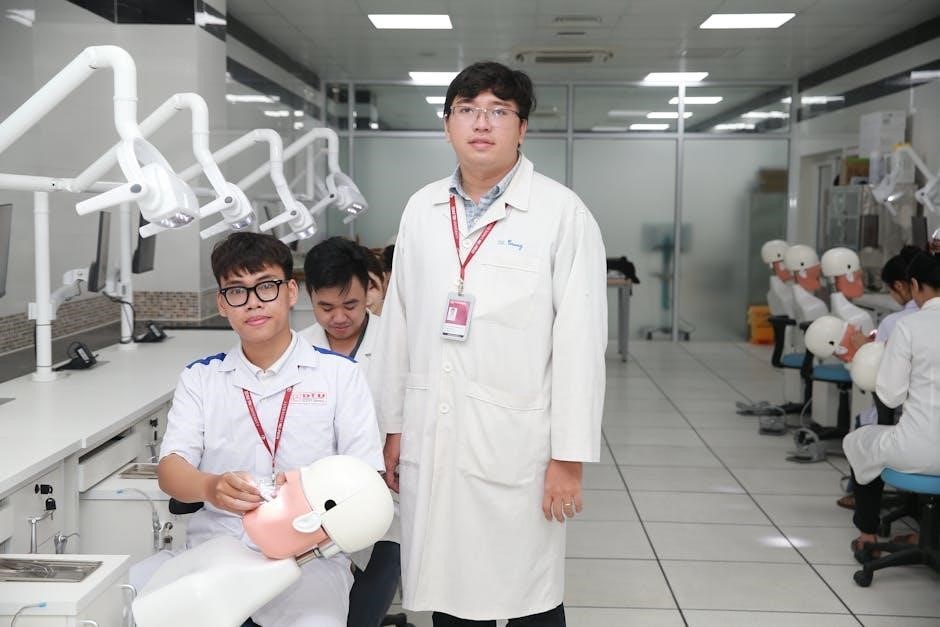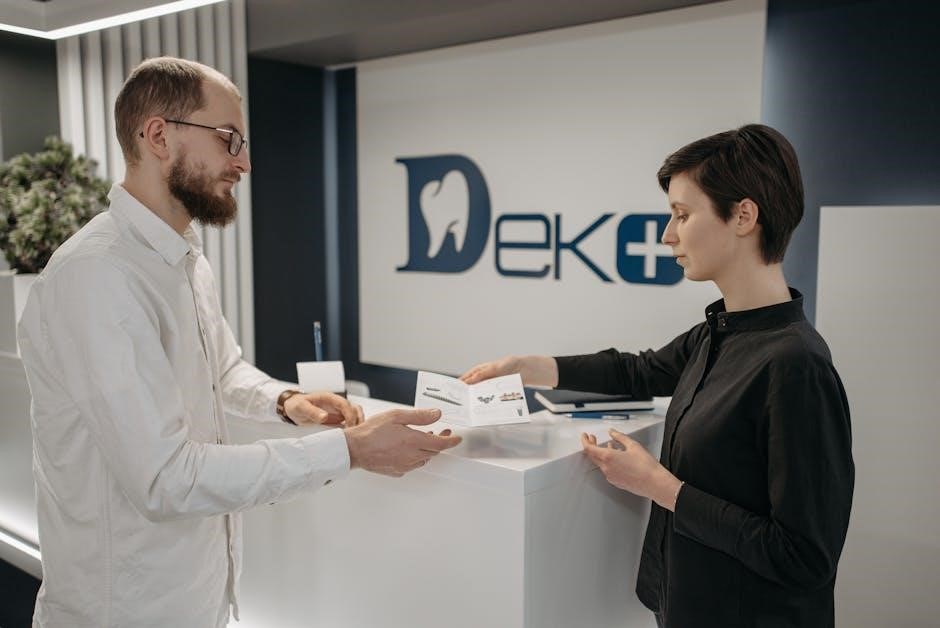Dental front desk training is essential for ensuring efficient practice operations and excellent patient care. It covers key skills like communication‚ organization‚ and HIPAA compliance‚ enabling staff to manage appointments‚ payments‚ and patient records effectively while maintaining confidentiality and providing a positive experience.
Importance of Front Desk Training in Dental Practices
Front desk training is crucial for dental practices as it ensures a smooth‚ patient-centered experience. A well-trained front desk team enhances patient satisfaction‚ streamlines operations‚ and boosts practice efficiency. They manage appointments‚ handle payments‚ and maintain confidentiality‚ all while adhering to HIPAA compliance. Effective training equips staff with the skills to communicate clearly‚ resolve issues‚ and maintain a positive office environment. This directly impacts patient retention‚ practice reputation‚ and overall success. Proper training also ensures compliance with legal and ethical standards‚ safeguarding patient data and upholding professional integrity. Investing in front desk training is essential for modern dental practices aiming to deliver exceptional care and maintain operational excellence.
Overview of the Dental Front Desk Role
The dental front desk role is multifaceted‚ serving as the first point of contact for patients. Key responsibilities include greeting patients warmly‚ managing appointments‚ handling payments‚ and maintaining accurate records. Front desk staff are also responsible for answering phone calls‚ responding to patient inquiries‚ and ensuring smooth communication between patients and clinical teams. They play a vital role in patient satisfaction by addressing concerns and providing clear information. Additionally‚ they must adhere to HIPAA guidelines to protect patient confidentiality. Effective front desk staff ensure seamless practice operations‚ contributing to a positive patient experience and overall practice success. Their role is central to creating a welcoming and efficient dental office environment.
Essential Skills for Dental Front Desk Staff
Effective communication‚ organizational abilities‚ and attention to detail are crucial. Proficiency in dental software‚ HIPAA compliance knowledge‚ and patient interaction skills ensure efficient and professional front desk operations.
Communication and Interpersonal Skills
Strong communication and interpersonal skills are vital for front desk staff to interact effectively with patients‚ team members‚ and dental professionals. Clear and concise interactions ensure understanding of patient needs‚ procedures‚ and financial details. Active listening and empathy build trust and rapport‚ making patients feel valued. Positive body language‚ including smiles and direct eye contact‚ enhances first impressions. Addressing patients by name and acknowledging their presence promptly fosters a welcoming environment. Effective communication also extends to coordinating with clinical staff‚ ensuring seamless workflow and maintaining a professional atmosphere. These skills are essential for resolving conflicts and handling difficult situations with patience and diplomacy‚ contributing to overall patient satisfaction and practice success.
Organizational and Time Management Skills
Organizational and time management skills are critical for dental front desk staff to efficiently handle multiple responsibilities. Maintaining a clutter-free workspace and staying organized ensures quick access to patient records‚ schedules‚ and financial documents. Prioritizing tasks‚ such as managing appointments and processing payments‚ helps maintain smooth operations. Effective time management involves balancing administrative duties with patient interactions‚ ensuring timely responses to phone calls and inquiries. Utilizing tools like calendars and checklists can enhance productivity. Strong organizational skills also support compliance with confidentiality standards‚ such as HIPAA‚ by securely managing patient data. By staying organized and managing time effectively‚ front desk staff can reduce stress‚ improve efficiency‚ and contribute to a positive patient experience.

Patient Interaction and Customer Service
Patient interaction and customer service are the foundation of a positive dental experience. Clear communication‚ empathy‚ and active listening ensure patient needs are met‚ fostering trust and satisfaction.
Greeting Patients and First Impressions
Greeting patients warmly is crucial for creating a positive first impression. Front desk staff should use welcoming language‚ address patients by name‚ and acknowledge their presence promptly. A smile and direct eye contact can make patients feel valued and comfortable. Clear communication and a friendly demeanor help establish trust and set the tone for a positive experience. Ensuring a seamless check-in process and addressing any concerns immediately demonstrates professionalism and care. First impressions are vital‚ as they influence patient satisfaction and loyalty to the practice. Proper training ensures staff consistently deliver exceptional service from the moment patients arrive.
Effective Patient Communication Techniques
Effective patient communication is key to building trust and ensuring clear understanding. Front desk staff should use clear‚ simple language to explain procedures‚ costs‚ and payment options‚ avoiding jargon. Active listening is essential to address patient concerns and answer questions thoroughly. Maintaining eye contact‚ smiling‚ and using a warm tone fosters a welcoming environment. Staff should also be mindful of non-verbal cues‚ such as body language and facial expressions‚ to convey empathy and professionalism. Tailoring communication to individual patient needs‚ such as addressing anxiety or language barriers‚ enhances satisfaction. Regular training ensures staff consistently deliver compassionate and effective communication‚ making patients feel valued and informed throughout their visit.
Appointment Scheduling and Management
Effective appointment scheduling ensures smooth practice operations‚ minimizing wait times and maximizing patient satisfaction. Front desk staff must efficiently manage bookings‚ reschedule as needed‚ and confirm appointments promptly.
Best Practices for Scheduling Appointments
Implementing best practices for scheduling appointments ensures efficiency and patient satisfaction. Start by maintaining a well-organized calendar‚ using dental software to track availability and avoid overlaps. Offer flexible time slots to accommodate different patient schedules‚ and confirm appointments via phone or email to reduce no-shows. Train staff to handle cancellations promptly and fill gaps in the schedule. Clear communication with patients about appointment durations and preparation steps is crucial. Additionally‚ prioritize urgent cases and ensure follow-ups for missed appointments. Regularly review scheduling processes to identify bottlenecks and improve workflow‚ ensuring seamless operations and a positive patient experience.
Managing Cancellations and No-Shows
Effective management of cancellations and no-shows is critical for maintaining a smooth workflow. Train staff to handle cancellations promptly by contacting patients to reschedule and filling the vacated slot with another patient. Use dental software to track cancellations and identify patterns. Implement a confirmation system‚ such as automated calls or emails‚ to reduce no-shows. Clearly communicate office policies‚ including fees for late cancellations or missed appointments. Maintain open lines of communication with patients to understand reasons for cancellations and address any concerns. Regularly review no-show rates and adjust strategies to minimize occurrences‚ ensuring optimal use of time and resources while preserving patient relationships.
Patient Data Management and Confidentiality
Securely handling patient records and maintaining confidentiality is crucial. Front desk staff must comply with HIPAA and PDPA regulations‚ ensuring patient data is protected and accessed only by authorized personnel.
Handling Patient Records and Confidentiality
Handling patient records requires utmost care to ensure confidentiality and compliance with regulations like HIPAA and PDPA. Front desk staff must securely store physical and digital records‚ limiting access to authorized personnel only. Patient information should never be shared without consent‚ and digital systems must use encryption and secure login protocols. Staff should verify patient identities before releasing any data and maintain accurate‚ up-to-date records. Proper disposal of outdated records is also critical to prevent unauthorized access. Training on confidentiality protocols is essential to ensure all team members understand their roles in protecting patient privacy. This ensures trust and legal compliance‚ safeguarding both the practice and patient information.
HIPAA Compliance for Front Desk Staff
HIPAA compliance is crucial for front desk staff to protect patient privacy and avoid legal consequences. Training ensures staff understand regulations regarding patient health information (PHI). Key areas include handling PHI securely‚ storing records properly‚ and limiting access to authorized personnel. Staff must verify patient identities before disclosing information and avoid discussing sensitive details in public areas. Regular updates on HIPAA policies and procedures are essential to maintain compliance. Proper disposal of patient records and secure electronic systems are also vital. By adhering to HIPAA guidelines‚ front desk staff safeguard patient trust and ensure the practice operates legally and ethically.

Payment Processing and Financial Management
Efficient payment processing and financial management are vital for dental practices. Training ensures accurate handling of payments‚ insurance claims‚ and patient accounts‚ maintaining financial integrity and patient trust.
Processing Payments and Handling Insurance
Processing payments and handling insurance requires precision to ensure smooth financial transactions. Front desk staff must verify insurance eligibility‚ process payments efficiently‚ and handle claims accurately. Clear communication with patients about payment options and insurance coverage is essential to avoid misunderstandings. Staff should maintain confidentiality and adhere to HIPAA guidelines when managing sensitive financial and insurance information. Proper training ensures that payments are processed correctly‚ reducing errors and enhancing patient satisfaction. Additionally‚ staying updated on insurance policies and payment methods helps in managing patient accounts effectively‚ contributing to the overall financial health of the dental practice.
Managing Patient Accounts and Billing
Managing patient accounts and billing involves maintaining accurate records‚ generating statements‚ and ensuring timely payments. Front desk staff must regularly update patient accounts‚ track outstanding balances‚ and issue reminders for overdue payments. Clear communication with patients about billing details and payment options is crucial to avoid misunderstandings. Additionally‚ staff should handle billing inquiries professionally and resolve discrepancies promptly. Utilizing dental practice management software can streamline billing processes‚ reducing errors and improving efficiency. Regular audits of patient accounts ensure accuracy and compliance with financial policies. Effective account management enhances patient trust and contributes to the financial stability of the dental practice‚ ensuring smooth operations and patient satisfaction.

Dental Software and Technology
Dental software streamlines front desk operations‚ enhancing efficiency in scheduling‚ billing‚ and patient data management. It ensures HIPAA compliance and improves overall practice management‚ supporting staff productivity.
Overview of Dental Practice Management Software
Dental practice management software is a comprehensive tool designed to streamline clinic operations. It integrates features like appointment scheduling‚ patient records management‚ billing‚ and insurance claims processing. The software enhances efficiency by automating tasks‚ reducing errors‚ and improving patient communication. Key functionalities include real-time scheduling‚ treatment planning‚ and financial reporting. Additionally‚ it ensures HIPAA compliance by securing patient data. Training on this software is crucial for front desk staff to manage daily operations effectively‚ ensuring a seamless and positive patient experience while maintaining data confidentiality and operational efficiency.
Using Software for Scheduling and Billing
Dental practice management software is indispensable for efficient scheduling and billing processes. It allows front desk staff to manage appointments in real-time‚ reducing no-shows with automated reminders. Billing features enable quick generation of invoices‚ processing of payments‚ and insurance claims submission. The software ensures accuracy in financial transactions and streamlines revenue cycle management. Integration with patient records and treatment plans further enhances workflow. Training staff to use these tools effectively is crucial for minimizing errors and maximizing productivity. Proper utilization of the software ensures seamless operations‚ improves patient satisfaction‚ and supports the overall success of the dental practice.
Patient Satisfaction and Experience
Patient satisfaction is crucial for dental practices‚ driven by positive interactions‚ clear communication‚ and efficient processes. Front desk staff play a key role in ensuring a welcoming environment and smooth operations.
Improving Patient Satisfaction at the Front Desk
Improving patient satisfaction at the front desk involves creating a welcoming environment‚ addressing patients by name‚ and ensuring clear communication. Warm greetings‚ attentive listening‚ and empathy build trust. Providing transparent information about procedures‚ costs‚ and payment options helps patients feel informed and valued. Efficiently managing appointments and reducing wait times enhances satisfaction. Front desk staff should also handle patient concerns promptly and professionally‚ offering solutions when issues arise. Maintaining confidentiality and adhering to HIPAA guidelines further fosters patient trust. By focusing on these strategies‚ front desk teams can significantly contribute to a positive patient experience‚ leading to higher satisfaction and loyalty.
Handling Patient Complaints and Concerns
Handling patient complaints and concerns effectively is crucial for maintaining trust and satisfaction. Front desk staff should listen actively‚ acknowledge the issue‚ and express empathy. It’s important to remain calm and professional‚ ensuring patients feel heard. Provide clear explanations and potential solutions‚ avoiding defensive language. Documenting the concern and any actions taken is essential for follow-up. If necessary‚ involve clinical staff or management to resolve the issue promptly. Clear communication and a focus on resolving the problem demonstrate commitment to patient care. Addressing concerns efficiently helps build patient loyalty and strengthens the practice’s reputation for quality service.

Team Collaboration and Support
Effective team collaboration ensures smooth dental practice operations. Front desk staff must communicate clearly with clinicians‚ support each other’s roles‚ and work together to enhance patient care efficiency.
Working Effectively with Dental Teams
Working effectively with dental teams requires strong communication and mutual respect. Front desk staff must collaborate seamlessly with clinicians‚ ensuring smooth patient flow and accurate information sharing. Clear communication helps prevent errors and enhances patient care. Active listening and empathy are crucial for building trust among team members. Understanding each other’s roles fosters a cohesive environment‚ allowing the front desk to anticipate clinical needs and provide timely support. Regular team meetings and feedback sessions can improve coordination and address challenges promptly. When everyone works together toward common goals‚ the practice operates more efficiently‚ and patient satisfaction increases. Effective teamwork is the backbone of a successful dental practice.
Supporting Clinical Staff for Smooth Operations
Supporting clinical staff is vital for ensuring seamless dental practice operations. The front desk plays a key role in preparing patient records‚ managing schedules‚ and coordinating appointments to minimize delays. Effective communication between the front desk and clinical team ensures that patient information is accurate and readily available. By handling administrative tasks efficiently‚ the front desk allows clinical staff to focus on patient care. Additionally‚ maintaining a clean and organized workspace‚ managing supplies‚ and assisting with patient flow are essential for supporting clinical operations. Proper HIPAA compliance and confidentiality must also be upheld when sharing patient information with clinical staff. This collaborative effort ensures smooth workflows and enhances overall patient care and satisfaction.
Emergency and Urgent Care Protocols
Effective emergency and urgent care protocols are critical for dental practices. The front desk must efficiently triage patient calls‚ communicate clearly‚ and maintain calm during emergencies to ensure patient safety and timely care.
Handling Dental Emergencies at the Front Desk
Handling dental emergencies at the front desk requires quick thinking and clear communication. The front desk staff must assess the situation‚ triage effectively‚ and prioritize urgent cases. Key responsibilities include staying calm‚ providing immediate guidance‚ and ensuring patients receive timely care. Effective communication with both patients and clinical staff is crucial to avoid delays. Staff should be trained to handle common emergencies‚ such as severe pain or trauma‚ while adhering to HIPAA guidelines. Proper documentation and follow-up are essential to maintain patient safety and practice efficiency. Regular training ensures the front desk is prepared to manage emergencies confidently and compassionately‚ upholding patient trust and practice standards.
Triaging Patient Calls and Appointments
Triaging patient calls and appointments is critical for efficient dental practice management. Front desk staff must quickly assess the urgency of patient needs‚ prioritizing emergencies over routine care. Effective communication skills are vital to determine the severity of each case. Staff should remain calm‚ empathetic‚ and professional‚ ensuring patients feel supported. Clear guidelines and training enable front desk teams to identify urgent situations‚ such as severe pain or infections‚ and schedule immediate appointments. For non-urgent cases‚ staff can provide guidance or reschedule as needed. Proper triaging ensures timely care‚ reduces wait times‚ and enhances patient satisfaction. Regular training and updated protocols help staff manage triaging confidently and effectively‚ maintaining smooth practice operations.
Marketing and Patient Acquisition
Effective front desk staff play a crucial role in marketing by enhancing patient satisfaction‚ which drives referrals and retention. They ensure positive first impressions and promote services.
Role of Front Desk in Dental Marketing
The front desk plays a vital role in dental marketing by serving as the practice’s first point of contact. Staff can enhance patient satisfaction‚ which directly impacts word-of-mouth referrals and online reviews. They act as ambassadors‚ influencing patient perceptions and loyalty. Effective communication and interpersonal skills are key to promoting services and handling inquiries. Front desk staff can also assist in managing social media engagement‚ patient testimonials‚ and community outreach programs. Their role in ensuring a positive patient experience contributes to the practice’s reputation and attracts new patients. Additionally‚ they can gather feedback to identify areas for improvement‚ further enhancing marketing strategies. Their efforts help build patient loyalty and drive long-term growth.
Strategies for Patient Retention and Referrals
Effective patient retention and referral strategies are crucial for dental practice growth. Front desk staff can play a significant role by fostering strong patient relationships through personalized interactions and attentive service. Implementing loyalty programs‚ sending follow-up communications‚ and offering referral incentives can encourage patients to return and recommend the practice to others. Additionally‚ ensuring prompt resolution of patient concerns and maintaining open communication helps build trust and satisfaction. Referral discounts or rewards for both existing and new patients can further enhance word-of-mouth marketing. By consistently delivering exceptional service‚ the front desk can create a positive experience that motivates patients to stay loyal and refer others‚ ultimately driving practice success and growth.
Continuous Learning and Professional Development
Continuous learning is vital for dental front desk staff to stay updated on industry trends‚ software‚ and patient care standards‚ ensuring ongoing professionalism and operational excellence.
Importance of Ongoing Training for Front Desk Staff
Ongoing training is crucial for front desk staff to stay updated on industry standards‚ software‚ and patient care practices. It ensures they remain proficient in handling patient data securely‚ managing appointments efficiently‚ and communicating effectively. Regular training also helps staff adapt to new technologies and regulatory changes‚ such as HIPAA compliance updates. By investing in continuous learning‚ practices can improve patient satisfaction‚ reduce errors‚ and maintain a smooth workflow. Training fosters confidence and competence‚ enabling front desk teams to handle emergencies‚ insurance queries‚ and patient concerns effectively. Ultimately‚ ongoing training supports the overall success of the dental practice by ensuring front desk staff are well-equipped to provide exceptional patient care and operational support.
Resources for Further Learning and Development
Access to updated resources is vital for continuous growth in dental front desk roles. The ADA policy manual and SAMHSA guidelines provide comprehensive insights into compliance and patient care. Online platforms like MDwise and IDA websites offer detailed manuals and training materials. Workshops and webinars on dental ethics and software engineering are also valuable. These resources help staff stay informed about HIPAA updates‚ communication techniques‚ and software proficiency. Regular updates ensure front desk teams are equipped to handle evolving patient needs and operational challenges effectively. Leveraging these resources fosters a culture of learning‚ enabling staff to deliver exceptional patient care and support practice success.
Dental front desk training is a cornerstone of efficient and patient-centered dental practices. By mastering essential skills‚ maintaining compliance‚ and fostering continuous learning‚ front desk staff play a pivotal role in ensuring smooth operations. From effective communication to HIPAA compliance and patient satisfaction‚ the topics covered in this manual provide a comprehensive foundation for success. Investing in ongoing training and leveraging available resources empowers staff to adapt to evolving challenges and deliver exceptional care. Ultimately‚ well-trained front desk teams are instrumental in driving practice growth‚ enhancing patient trust‚ and contributing to the overall success of the dental practice.
